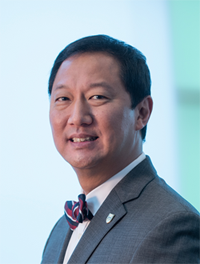
Professor Santa Ono, President and Vice-Chancellor
UBC President Santa Ono hosted a virtual event on Monday, September 14, to celebrate the 2020 UBC Indigenous Strategic Plan at our Vancouver campus, located on the traditional, ancestral and unceded territory of the Musqueam.
The celebration featured guest speakers, including Musqueam Elder Larry Grant, ʔaʔsiwɬ Grand Chief Stewart Phillip, and other Indigenous leaders and human rights experts, as well as a panel discussion with members of our Indigenous student, faculty, staff and alumni communities (see below for a list of speakers).
Watch the recording of the event below.
Celebration Webcast
Download the full program [PDF]
A future celebration is being planned for our Okanagan campus, located on the unceded territory of the Syilx Okanagan Nation, at a later date.
Speakers and Honoured Guests
Elder Larry Grant
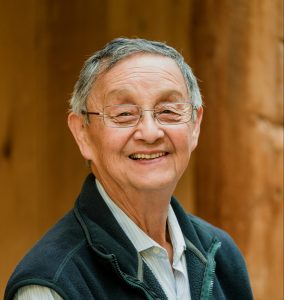 Larry Grant, Musqueam Elder, was born and raised in Musqueam traditional territory by a traditional hən̓q̓əmin̓əm̓ speaking Musqueam family. After 4 decades as a tradesman, Larry enrolled in the First Nations Languages Program, which awoke his memory of the embedded value that the hən̓q̓əmin̓əm̓ language has to self-identity, kinship, culture, territory, and history prior to European contact. He is presently assisting in revitalizing hən̓q̓əmin̓əm̓ in the Musqueam Language and Culture Department, and co-teaching the introductory hən̓q̓əmin̓əm̓ course through UBC.
Larry Grant, Musqueam Elder, was born and raised in Musqueam traditional territory by a traditional hən̓q̓əmin̓əm̓ speaking Musqueam family. After 4 decades as a tradesman, Larry enrolled in the First Nations Languages Program, which awoke his memory of the embedded value that the hən̓q̓əmin̓əm̓ language has to self-identity, kinship, culture, territory, and history prior to European contact. He is presently assisting in revitalizing hən̓q̓əmin̓əm̓ in the Musqueam Language and Culture Department, and co-teaching the introductory hən̓q̓əmin̓əm̓ course through UBC.
Larry is the Elder-in-Residence at UBC’s First Nations House of Learning. He is a Faculty Fellow at St. John’s College, and the inaugural Honorary Life Fellow for Green College. In 2010, he received the Alumni Award of Distinction from Vancouver Community College, and in 2014, he became an Honorary Graduate from the Indigenous Teacher Education Program (NITEP) at UBC.
Dr. Sheryl Lightfoot
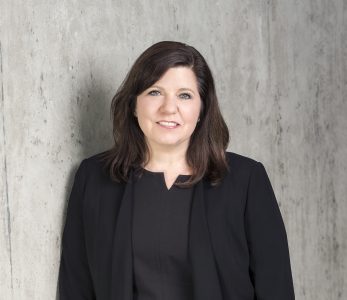 Sheryl Lightfoot is Anishinaabe, a citizen of the Lake Superior Band of Ojibwe. She is Canada Research Chair in Global Indigenous Rights and Politics and Associate Professor in Political Science, the School of Public Policy and Global Affairs and Indigenous Studies. She is also Senior Advisor to the President on Indigenous Affairs and has been a co-lead on the development of the Indigenous Strategic Plan.
Sheryl Lightfoot is Anishinaabe, a citizen of the Lake Superior Band of Ojibwe. She is Canada Research Chair in Global Indigenous Rights and Politics and Associate Professor in Political Science, the School of Public Policy and Global Affairs and Indigenous Studies. She is also Senior Advisor to the President on Indigenous Affairs and has been a co-lead on the development of the Indigenous Strategic Plan.
As one of the world’s experts in global Indigenous politics, Sheryl’s research specializes in complex questions of Indigenous peoples’ rights and how those rights are being claimed and negotiated. Her work explores both practical and theoretical aspects of implementation of Indigenous rights globally as well as in domestic contexts. She is the author of Global Indigenous Politics: A Subtle Revolution as well as numerous journal articles and book chapters.
She holds a PhD in Political Science from the University of Minnesota as well as a master’s degree from the Humphrey Institute of Public Affairs, University of Minnesota. She also has fifteen years’ volunteer and contract experience with a number of American Indian tribes and community-based organizations in the Minneapolis-St. Paul area, including nine years as Chair of the Board of the American Indian Policy Center, a research and advocacy group.
Dr. Margaret P. Moss
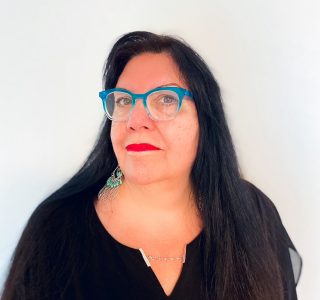 Margaret Moss is an enrolled member of the Mandan, Hidatsa, and Arikara Nation (Three Affiliated Tribes of North Dakota), and has equal lineage as Canadian Sioux/ Saskatchewan. Dr. Moss is the first and only American Indian to hold both nursing and juris doctorates. She is currently at the University of British Columbia as Director of the First Nations House of Learning, and in the Faculty of Applied Science as an Associate Professor in the School of Nursing. Immediately prior, Dr. Moss was Assistant Dean of Diversity and Inclusion/Associate Professor (tenured) at the University at Buffalo, School of Nursing. She was a 2018 Faculty Fellow for Inclusive Excellence at the University level, and co-chair of the Indigenous Inclusion Sub-Committee for Inclusive Excellence. Moss was on faculty at Yale University (2010–2015) where she directed both the Masters and Doctoral programs on leadership and policy. During this time, she was a 2014 Fulbright Visiting Research Chair in Aboriginal/Indigenous Life and Culture in the North American Context at McGill University, Montreal, QC (2014). There she analyzed Canadian Census and Health laws and the resulting deficits for Indigenous health outcomes.
Margaret Moss is an enrolled member of the Mandan, Hidatsa, and Arikara Nation (Three Affiliated Tribes of North Dakota), and has equal lineage as Canadian Sioux/ Saskatchewan. Dr. Moss is the first and only American Indian to hold both nursing and juris doctorates. She is currently at the University of British Columbia as Director of the First Nations House of Learning, and in the Faculty of Applied Science as an Associate Professor in the School of Nursing. Immediately prior, Dr. Moss was Assistant Dean of Diversity and Inclusion/Associate Professor (tenured) at the University at Buffalo, School of Nursing. She was a 2018 Faculty Fellow for Inclusive Excellence at the University level, and co-chair of the Indigenous Inclusion Sub-Committee for Inclusive Excellence. Moss was on faculty at Yale University (2010–2015) where she directed both the Masters and Doctoral programs on leadership and policy. During this time, she was a 2014 Fulbright Visiting Research Chair in Aboriginal/Indigenous Life and Culture in the North American Context at McGill University, Montreal, QC (2014). There she analyzed Canadian Census and Health laws and the resulting deficits for Indigenous health outcomes.
As a RWJF Health Policy Fellow she staffed the US Senate Special Committee on Aging (2008-9) during the ‘OBAMACARE’ years and was original lead staff on the now enacted National Alzheimer’s Project Act. Moss has published the first nursing textbook on American Indian health (Springer 2015), which won AJN Book of the Year in 2 categories (2016). Her new text, co-edited, “Health Equity and Nursing’ was out in March 2020 (Springer).
Dr. Moss earned her PhD in Nursing from the University of Texas, Houston HSC and her JD from Hamline University School of Law in St Paul, MN. She earned tenure during her time at the University of Minnesota 2000-2010. Moss’ clinical experience, included being staff nurse and then House Supervisor and Patient Education Specialist at the US Public Health Service, Indian Health Service/ Santa Fe Indian Hospital (1991–1996). Her research methods have included ethnography, geographical information systems, survey, and other qualitative methods. Moss has published her book(s), other chapters and papers primarily focused on American Indian aging, policy, health & education issues. She has given over 150 presentations on these topics of note most recently in New Zealand, Australia, & Canada and across the US.
Professor Santa Ono
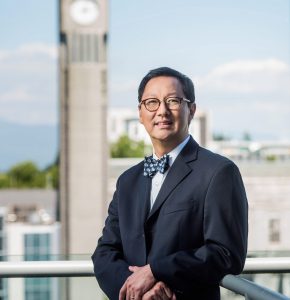 Santa Ono is the President and Vice-Chancellor of the University of British Columbia, a global centre for research and teaching with 64,000 students, 16,500 faculty and staff, and a $2.5 billion operating budget. Prior to his appointment in 2016, he served as president of the University of Cincinnati. Inside Higher Education named him America’s most notable university president in 2015. In 2016, the American Council on Education awarded him the Reginald Wilson Diversity Leadership Award.
Santa Ono is the President and Vice-Chancellor of the University of British Columbia, a global centre for research and teaching with 64,000 students, 16,500 faculty and staff, and a $2.5 billion operating budget. Prior to his appointment in 2016, he served as president of the University of Cincinnati. Inside Higher Education named him America’s most notable university president in 2015. In 2016, the American Council on Education awarded him the Reginald Wilson Diversity Leadership Award.
As a professor of medicine and biology, Ono has worked at Harvard, Johns Hopkins, University College London, and Emory universities. He was also inducted by Johns Hopkins into its Society of Scholars, and as a Fellow of the Royal Society of Chemistry, the Canadian Academy of Health Sciences, the American Association for the Advancement of Science and the National Academy of Inventors, USA.
Ono’s research encompasses the immune system, eye inflammation and age-related macular degeneration.
An avid music lover, Ono studied cello with Carolyn Hopkins, Carter Brey at the Preparatory Division of the Peabody Conservatory of Music and privately with Wallace Toroni of the Baltimore Symphony. He then stopped playing cello for 25 years until he picked it up again 5 years ago in Cincinnati. There he was fortunate to study with Alan Rafferty of the Cincinnati Symphony.
He is married to Wendy Yip, who trained as an immunologist at McGill and as a lawyer at Boston University. They have two daughters, Juliana and Sarah.
Chief Wayne Sparrow
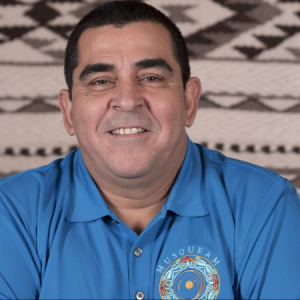 Wayne Sparrow (yək̓ʷyak̓ʷəl̕əq) was first elected Chief of Musqueam Indian Band in 2012, after serving as a Councillor for many years. He served two consecutive two-year terms as Chief before being elected to a four-year term in November 2016.
Wayne Sparrow (yək̓ʷyak̓ʷəl̕əq) was first elected Chief of Musqueam Indian Band in 2012, after serving as a Councillor for many years. He served two consecutive two-year terms as Chief before being elected to a four-year term in November 2016.
Chief Sparrow sits on the Musqueam Fisheries Commission. As MIB’s chief negotiator, he leads Musqueam in signing precedent-setting agreements that renewed and strengthened relationships between Musqueam, neighbouring First Nations and other partners.
Chief Sparrow’s principled approach is to be open and involved directly with his community through his knowledge and passion for Musqueam culture and traditions. Chief Sparrow is also actively involved in Musqueam’s participation in sports and is a proud supporter of all Musqueam youth.
ʔaʔsiwɬ Grand Chief Stewart Phillip
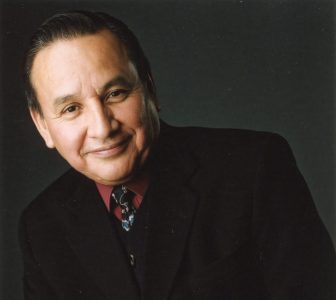 In October 2008, Grand Chief Stewart Phillip concluded his fourth consecutive four-year term as Chief of the Penticton Indian Band (PIB), and served the Band as Chief for a total of 16 years. In addition, he served as an elected Band Councilor for a 10-year period. Aside from serving as a member of the PIB Council for a total of 24 years, he served as the Chair of the Okanagan Nation Alliance for 15 years.
In October 2008, Grand Chief Stewart Phillip concluded his fourth consecutive four-year term as Chief of the Penticton Indian Band (PIB), and served the Band as Chief for a total of 16 years. In addition, he served as an elected Band Councilor for a 10-year period. Aside from serving as a member of the PIB Council for a total of 24 years, he served as the Chair of the Okanagan Nation Alliance for 15 years.
In October 2006, the Okanagan Nation, led by the Elders of the Penticton Indian Band, acknowledged his lifetime commitment to the defense of Indigenous Peoples’ Title and Rights by bestowing on him and his family the rare honour of the title of Grand Chief.
Over 38 years, Grand Chief Stewart Phillip worked within the Penticton Indian Band Administration holding a variety of positions such as Band Administrator, Director of Land Management, Education Counselor, Economic Development Officer and Band Planner.
Aside from serving as a member of the PIB council for a total of 24 years, he is proud to be in his eighth three-year term as the President of the Union of BC Indian Chiefs.
He has taken an active role in the defense of Aboriginal Title and Rights by readily offering support to Native communities in need. He has taken a personal approach seeing first-hand the impact of fish farms in the Broughton Archipelago, lobbying on Parliament Hill to defeat the First Nations Governance Act, standing with Elders of Treaty 8 against oil and gas development in the Peace River, burning referendum ballots with fellow chiefs in protest and has stood on the steps of the Legislature with 3000 other people united under the Title and Rights Alliance banner. In November 2018, Grand Chief Phillip was awarded a Doctor of Laws, honoris causa, from the University of British Columbia for his life-long advocacy and work.
Grand Chief Phillip has been married for 34 years to his wife Joan. They have three grown sons, two daughters, six granddaughters and nine grandsons. He is currently enjoying his 32nd year of sobriety. In this regard, he is a firm believer in leading by example.
“I hereby commit to work collectively with the Chiefs of the UBCIC, the First Nations Summit and the BC Assembly of First Nations. We must work together to ensure the governments of Canada and British Columbia endorse and implement the UN Declaration on the Rights of Indigenous Peoples for our Nations and communities. We must work together to compel government to update the Comprehensive Claims Policy to reflect the many hard-fought court victories such as the Delgamuuk’w, Haida and William cases” — Grand Chief Stewart Phillip.
The Honourable Joyce Murray
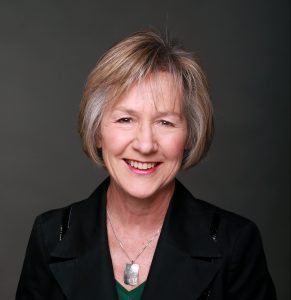 Following a highly successful 25-year career building an international reforestation company and 4 years in the provincial cabinet of the B.C. Liberal government, the Honourable Joyce Murray was appointed Minister of Digital Government on November 20, 2019.
Following a highly successful 25-year career building an international reforestation company and 4 years in the provincial cabinet of the B.C. Liberal government, the Honourable Joyce Murray was appointed Minister of Digital Government on November 20, 2019.
The Member of Parliament for Vancouver Quadra since 2008, Joyce served as Parliamentary Secretary of the Treasury Board and the President after the 2015 general election. In 2016, she lead the development of the new Centre for Greening Government. Making federal government operations more environmentally friendly and efficient was a natural project for Joyce, whose entrepreneurial spirit led her to build a company that has planted 1.5 billion trees across Canada and internationally – more than 500,000 of which she planted herself.
Joyce Murray has always been a thought-leader, driving progressive new policies in government. Whether advocating for strong, smart environmental measures or being an early advocate of the legalization and regulation of cannabis, Joyce’s ability to envision and deliver on bold new ideas comes from her depth of experience in politics and business.
She is passionate about investing in a fairer, greener economy that empowers future generations, and confident that digital innovation will offer important opportunities for improving services to Canadians.
The Honourable David Eby
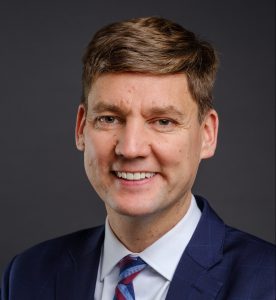 David Eby is the provincial government representative (MLA) for Vancouver-Point Grey, first elected in 2013.
David Eby is the provincial government representative (MLA) for Vancouver-Point Grey, first elected in 2013.
A proud local resident, David was re-elected in 2017 to serve a second term in the B.C. Legislature and in July 2017 was appointed to his current role as Attorney General by Premier John Horgan. David is also responsible for Gambling policy, Liquor policy and the Insurance Corporation of BC (ICBC) for the province.
Before he was elected, David was the Executive Director of the BC Civil Liberties Association, an adjunct professor of law at the University of British Columbia, president of the HIV/AIDS Legal Network, and served on the Vancouver Foundation’s Heath and Social Development Committee.
An award-winning human rights lawyer, he has been repeatedly recognized in local media as one of British Columbia’s most effective advocates and has appeared at all levels of court in BC.
His years of legal advocacy at Pivot Legal Society to protect the human rights and dignity of homeless and under-housed residents of Vancouver’s Downtown Eastside were recognized in 2011 by the UN Association in Canada and the B.C. Human Rights Coalition with their annual award.
David is the author of several books and articles on legal rights. His handbook on arrest rights is now in its third printing, with more than 10,000 copies in circulation.
When he’s not working, David spends his free time skiing, riding bikes, and going to UBC Thunderbird basketball games with his family.
Professor Kristen Carpenter
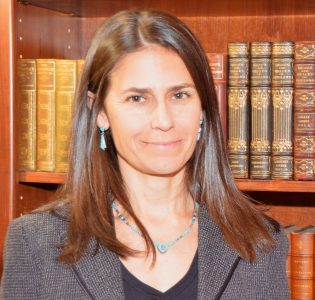 Kristen Carpenter is Council Tree Professor of Law and Director of the American Indian Law Program at the University of Colorado Law School. Professor Carpenter also serves on the United Nations Expert Mechanism on the Rights of Indigenous Peoples (EMRIP) as its member from North America. She is a graduate of Dartmouth College and Harvard Law School.
Kristen Carpenter is Council Tree Professor of Law and Director of the American Indian Law Program at the University of Colorado Law School. Professor Carpenter also serves on the United Nations Expert Mechanism on the Rights of Indigenous Peoples (EMRIP) as its member from North America. She is a graduate of Dartmouth College and Harvard Law School.
In her UN capacity, Professor Carpenter provides advice to the Human Rights Council and assists states and Indigenous peoples in realizing the aims of the UN Declaration on the Rights of Indigenous Peoples, most recently in Canada, Chile, Finland, Mexico, South Africa, and Thailand. She participates in World Intellectual Property Organization (WIPO) and United Nations Educational, Scientific, and Cultural Organization (UNESCO) processes associated with cultural rights, including traditional knowledge, Indigenous languages, and repatriation.
At the University of Colorado, Professor Carpenter teaches courses in international human rights, Indigenous peoples’ law, and property law. She has been a founding member of the University’s Center for Native American and Indigenous Studies and Associate Dean at the Law School. In 2016, she was the Oneida Indian Nation Visiting Professor at Harvard Law School. Professor Carpenter is a co-author of the leading casebook in Federal Indian Law, as well as many publications on Indigenous peoples’ legal issues. Professor Carpenter advises U.S. tribes and Indigenous organizations in pro bono cases concerning land rights, religious and cultural freedoms, and child welfare.
Grand Chief Wilton Littlechild
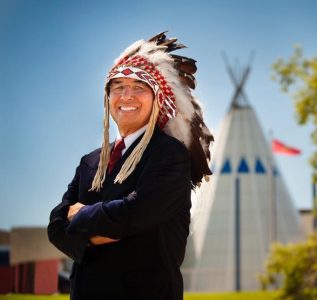 Wilton ‘Willie’ Littlechild was born in 1944 and raised by his grandparents on the Ermineskin Cree reservation at Maskwacîs, Alberta. Guided by his grandfather’s traditional cultural knowledge from a young age, his grandmother also encouraged Wilton to appreciate the value of formal education. He attended residential schools from 1951 to 1964, and played a wide variety of sports, including hockey, football, baseball and swimming. Finding solace in sport helped Wilton find the strength and resilience to endure an environment of institutional abuse and separation from his family.
Wilton ‘Willie’ Littlechild was born in 1944 and raised by his grandparents on the Ermineskin Cree reservation at Maskwacîs, Alberta. Guided by his grandfather’s traditional cultural knowledge from a young age, his grandmother also encouraged Wilton to appreciate the value of formal education. He attended residential schools from 1951 to 1964, and played a wide variety of sports, including hockey, football, baseball and swimming. Finding solace in sport helped Wilton find the strength and resilience to endure an environment of institutional abuse and separation from his family.
Athletic pursuits taught Wilton that with hard work and dedication he could excel and fulfill his potential, even in difficult circumstances. These lessons also shaped Wilton’s approach to higher education. A diligent student, he attended the University of Alberta and earned a bachelor’s degree in physical education in 1967, followed by a master’s degree in 1975. He also completed a law degree in 1976, becoming the first Treaty First Nation person from Alberta to become a lawyer. Wilton also became the first Treaty First Nation person to be elected a Member of Parliament in Canada, representing the riding of Wetaskiwin-Rimbey from 1988 to 1993. For over four decades he has worked with the United Nations to advocate for Indigenous sport, traditional games and global Indigenous rights. He also served as a Commissioner for Canada’s Truth and Reconciliation Commission, and was honored by the Chiefs of Treaty Nos. 6, 7 and 8 (Alberta) as “International Chief”.
While studying at the University of Alberta, Wilton played for the Golden Bears hockey and swim teams and worked as student manager of the university’s football and basketball teams. Committed to empowering others through sport, he also founded and coached the first all-Indigenous junior hockey team in Alberta and organized referee and coaching clinics across the province. In 1967 and 1974 he received the Tom Longboat award, which recognizes the most outstanding Indian athlete and for their outstanding contributions to sport in Canada.
He has won over seventy regional, national and international championships which have been recognized in eight sport halls of fame, including the Canada Sports Hall of Fame.
A pioneering role model, organizer and advocate for Indigenous sport in Canada, Wilton Littlechild has worked tirelessly over five decades to create new opportunities for Indigenous athletes. Notable examples of the many events and organizations he has helped establish at every level of competition include the creation of the North American Indigenous Games in 1990 and the World Indigenous Nations Games in 2015 in Brazil and 2017 in Treaty No. 6 Territory. Wilton continues to promote Indigenous sport as an important component of reconciliation, community building and an enduring expression of cultural identity, offering young people in particular, a way “to honour the blessing that you have physically, combine it with mental, cultural and the spiritual balance, so that you have a wholesome foundation for life.”
The Honourable Marion Buller
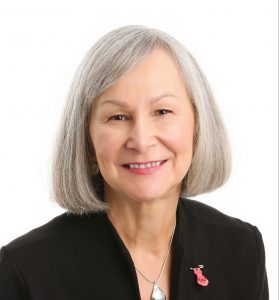 Marion Buller is a member of the Mistawasis Nehiyawak, a Cree First Nation in Saskatchewan. She started her legal career as a lawyer, practicing in criminal, administrative and human rights law. She was the Commission Counsel for the Cariboo-Chilcotin Justice Inquiry. She was Director and President of the Indigenous Bar Association and other organizations.
Marion Buller is a member of the Mistawasis Nehiyawak, a Cree First Nation in Saskatchewan. She started her legal career as a lawyer, practicing in criminal, administrative and human rights law. She was the Commission Counsel for the Cariboo-Chilcotin Justice Inquiry. She was Director and President of the Indigenous Bar Association and other organizations.
Ms. Buller was the first Indigenous woman appointed as a Provincial Court Judge in BC. She presided in courts in many locations across BC, including the northern circuit court. She founded the First Nations Court and provided the foundation for the Indigenous Family Court. These are courts that consider the special circumstances of Indigenous people. Ms. Buller has also written extensively about Indigenous and Human rights.
After twenty-two years as a judge, Ms. Buller was appointed as the Chief Commissioner for the National Inquiry into Missing and Murdered Indigenous Women and Girls. This was a precedent-setting and truly national inquiry. The National Inquiry’s strongly-worded Final Report and Calls for Justice have attracted both national and international attention.
Dr. Charles Menzies
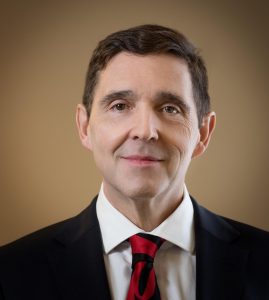 Dr. Charles Menzies is a member of Gitxaała Nation. He is a Professor in the Department of Anthropology on UBC’s Vancouver campus; he has been a faculty member at UBC since 1996.
Dr. Charles Menzies is a member of Gitxaała Nation. He is a Professor in the Department of Anthropology on UBC’s Vancouver campus; he has been a faculty member at UBC since 1996.
Charles is recognized as a strong advocate for shared governance, transparency, and democratic process. He has served as Member-at-Large on the UBC Faculty Association, as elected Director of the University Neighbourhoods Association, and as elected member of UBC’s Board of Governors. Charles is currently an elected member of the UBC-V Senate. As a representative of faculty and university residents, Charles has consistently advocated for the expansion of democratic principles and effective community engagement.
Charles has a PhD in anthropology from the City University of New York and has published in anthropological, political economic, and Indigenous Studies journals. While at UBC, Charles’ research has focused on First Nations natural resource management, decolonization, and social justice in human relations. His most recent book is People of the Saltwater, a story of his home community Gitxaała, north coast BC.
The Honourable Steven Lewis Point
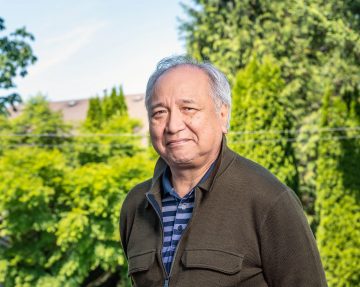 UBC’s 19th Chancellor, the Honourable Steven Lewis Point is a double alumnus of UBC and retained close ties with the University after receiving his Bachelor of Laws in 1985. Mr. Point served as director of the First Nations Legal Studies program at the Peter A. Allard School of Law from 1991 to 1994. He was awarded an honorary Doctor of Laws degree in 2013 for his exceptional commitment in the field of law, legal and Aboriginal education, and his leadership in the Indigenous community.
UBC’s 19th Chancellor, the Honourable Steven Lewis Point is a double alumnus of UBC and retained close ties with the University after receiving his Bachelor of Laws in 1985. Mr. Point served as director of the First Nations Legal Studies program at the Peter A. Allard School of Law from 1991 to 1994. He was awarded an honorary Doctor of Laws degree in 2013 for his exceptional commitment in the field of law, legal and Aboriginal education, and his leadership in the Indigenous community.
In addition to his role as the 28th Lieutenant Governor of British Columbia, Point’s career included practicing as a lawyer, working at the Union of British Columbia Indian Chiefs and in the Department of Employment & Immigration, serving as a provincial court judge and the Chief Commissioner of the British Columbia Treaty Commission, and chairing the advisory committee that worked to implement the recommendations from the Missing Women Commission of Inquiry.
Mr. Point is a member of the Skowkale First Nation and has advocated for Indigenous people throughout his career, pressing for greater recognition of their contributions and their fuller involvement in all aspects of life in British Columbia.
Mr. Point is a recipient of the Queen Elizabeth II Golden and Diamond Jubilee Medals, the Order of B.C, the Joseph H. Cohen Award from the Justice Institute of British Columbia Foundation, a National Aboriginal Achievement Award, the Order of Chilliwack, and honourary Doctorate of Laws degrees from the University of the Fraser Valley and Capilano University.
Vicki Lynne George
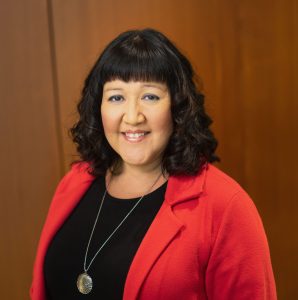 Vicki Lynne George is Wet’suwet’en and she is a UBC alumna who received an award in recognition for outstanding service and leadership in the community at the Dean’s Reception for Graduating Student Leaders.
Vicki Lynne George is Wet’suwet’en and she is a UBC alumna who received an award in recognition for outstanding service and leadership in the community at the Dean’s Reception for Graduating Student Leaders.
Vicki developed and produced “The Constitution Express: A Multimedia History” (2005-2006), a joint project with UBC’s First Nations Studies program and the Union of BC Indian Chiefs. Generational activism has deep roots for Vicki. Her father, Ron George, a prominent Indigenous leader, was a key participant and organizer in the Constitution Express, and Vicki’s project started an archive for this historical movement that resulted in Section 35 being included in the Canadian Constitution. To date, Vicki’s project is still the only significant work on this extraordinary Indigenous history. Vicki’s project led to her being a documentary subject in the film “The Road Forward” (2017), written and directed by Marie Clements.
She has applied her knowledge and experience with services that include Indigenous cultural awareness training, Indigenous-settler history, guest lecturing, presentations and advancing Indigenous initiatives with post-secondary institutions and companies. Vicki builds bridges and works at improving relationships between Indigenous and non-Indigenous people.
Laura Beaudry
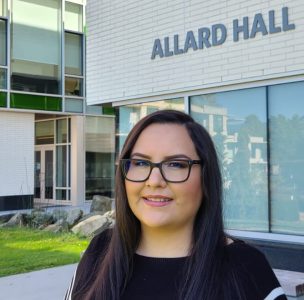 Laura Beaudry is Cree and Métis originally from Grouard, Alberta and grew up on the Kapawe’no First Nation. Laura has lived as an uninvited guest on the territories of the Musqueam, Squamish and Tsleil-Waututh nations since 2006. Laura acknowledges that it is a privilege to live, learn and prosper on someone else’s territory so she does her best to give back to the community through advocacy work for Indigenous students on the UBC Vancouver campus. Laura has been involved in several student groups including the Indigenous Committee (AMS), Indigenous Leadership Collective (Arts), Indigenous Collective (CiTR 101.9), the Indigenous Legal Students Association (Allard) and is now proud to represent the Indigenous student population as the Indigenous Councilor on the AMS Council for the 2020-2021 year.
Laura Beaudry is Cree and Métis originally from Grouard, Alberta and grew up on the Kapawe’no First Nation. Laura has lived as an uninvited guest on the territories of the Musqueam, Squamish and Tsleil-Waututh nations since 2006. Laura acknowledges that it is a privilege to live, learn and prosper on someone else’s territory so she does her best to give back to the community through advocacy work for Indigenous students on the UBC Vancouver campus. Laura has been involved in several student groups including the Indigenous Committee (AMS), Indigenous Leadership Collective (Arts), Indigenous Collective (CiTR 101.9), the Indigenous Legal Students Association (Allard) and is now proud to represent the Indigenous student population as the Indigenous Councilor on the AMS Council for the 2020-2021 year.
Laura graduated from UBC in 2019 with a Bachelor of Arts in Anthropology and a minor in Gender, Race, Sexuality and Social Justice. Laura is now a second-year law student at the Allard School of Law on the UBC Vancouver campus. Laura is passionate about seeking justice for Indigenous peoples through the legal system and believes that this can be achieved through replacing colonial legal systems with Indigenous legal systems and community and cultural-based practices.